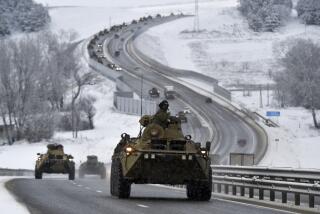Zambia Turns Cautious on Sanctions Against Pretoria
- Share via
LUSAKA, Zambia — President Kenneth D. Kaunda, whose country depends heavily on trade with South Africa, has sounded a note of caution amid the calls for imposition of tough sanctions against Pretoria.
Kaunda acknowledged Sunday that South Africa’s announcement of economic reprisals against hostile black African states, including Zambia and Zimbabwe, “will affect our economy very adversely indeed.”
He fended off questions on what kind of sanctions Zambia plans to impose against South Africa.
Kaunda told journalists Zambia will not cut off air links with South Africa because it would need to coordinate any such action with other Commonwealth nations, the European Communities and the United States.
Kaunda’s cautious stand contrasts strongly with that of Zimbabwe’s Prime Minister Robert Mugabe, who said last week his country would fully implement by the end of the year a package of sanctions approved by six Commonwealth countries--though not by Britain--which includes a severing of air links.
‘Noble Sacrifices’
Mugabe told a Heroes’ Day memorial service Monday: “We must proceed immediately to gear ourselves to effective measures. . . . In doing so, our nation will be called upon to be prepared to endure hardship. . . . Let each and every one make noble sacrifices.”
Both Zambia and Zimbabwe trade extensively with South Africa, and the two landlocked nations rely on South African ports for a high proportion of their imports.
Zambia is especially dependent on South Africa because its economy is based almost entirely on copper mining and much of the equipment used in the mines comes from South Africa.
Pretoria announced last week that it has begun charging a levy on goods bound for Zambia and Zimbabwe transported across South Africa and has imposed stricter border controls.
Foreign Minister Roelof F. (Pik) Botha said the levy was introduced because of the tough pro-sanctions attitude of these two states and will make them “put their money where their mouth is.”
Shortages, Higher Prices
The new measures are expected to result in shortages and higher prices in Zambia, which is in the midst of a grave economic crisis because of a sharp fall in the world price of copper.
Kaunda said the measures will mean that “we will have to suffer that much more. We have to thank the West for supporting apartheid.”
Zambia was not going to apply sanctions unilaterally, he added.
“We can’t do it piecemeal. It’s a complicated affair. We want sanctions to succeed. It’s not just a matter of a demonstration of hatred of apartheid,” he said.
Western diplomats said that Kaunda’s relatively moderate tone does not mean that he has climbed down dramatically from his repeated strong calls for sanctions.
But he was clearly well aware of the widespread suffering and possible political uncertainty that sanctions could cause, the diplomats added.
‘The Reality of Sanctions’
“There are signs that they are applying the retro-rockets as they get to grips with the reality of sanctions,” said a Western ambassador who asked not to be identified.
But diplomats said Zambia has little choice but to continue to use South African ports because more than 60% of its imports came via this route and the main alternative via Dar es Salaam is riddled with problems.
The port of Dar es Salaam was grossly inefficient and the Chinese-built Tazara Railway linking Zambia with the Tanzanian coast is not reliable, they added.
Tazara General Manager Standwell Mapara said in an interview on Zambian television Sunday that the line was carrying only about half of its annual capacity of 2.5 million tons and would welcome the opportunity to carry more traffic.
But diplomats said that although Tazara traffic could rise sharply if sanctions took effect, congestion at Dar es Salaam would continue to make the northern rail route an unattractive proposition.
More to Read
Sign up for Essential California
The most important California stories and recommendations in your inbox every morning.
You may occasionally receive promotional content from the Los Angeles Times.













